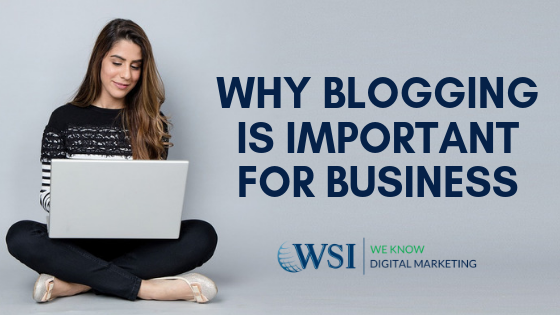
While there’s some debate around the relevance of blogging in today’s social media marketing environment, it’s really a non-negotiable. Whether you’re a small business or a multinational organisation, blogging remains integral to the success of online content marketing.
Quality online content is essential for brand awareness from social media, email marketing, direct mail to business blogging. Posting relevant, informative and regular blogs is effectively a marketing tactic to increase the online visibility of your business. Just like other marketing channels, blogging helps support your business growth. In this article we take a look at why your business should start blogging and the countless benefits of quality content.
Why Should Brands Consider Businesses Blogging?
Billions of people all over the world access the internet every day whether they shop online or want to stay updated or be entertained. Good quality content means people want to engage with their favourite brands and that is where blogging comes in. A well-written blog can bring a host of advantages to your business.
Great Source Of Website Traffic
A business blog gives you the opportunity to create quality, informative and relevant content for your customers. It’s a marketing tactic that can help drive traffic back to your website without using paid advertising (PPC) or email marketing. The latter, of course, is very useful when following best practice methodologies but it can take long to build a trusted email list.
At the same time, online ads can be time consuming and expensive as brands often need a professional digital marketing agency to really get ahead. Blogging can help solve this conundrum as every blog post is essentially one more indexed page on your website. That means there is another opportunity for your brand to appear in search engines and drive organic traffic to your website.
Get Found On Social Media
A good blog also helps people discover your brand on social media as they can share the content with all of their followers. Whether you’re on Twitter, LinkedIn, Facebook or Pinterest, blogging is a powerful way to expose new customers to your business.
When sharing your blog online, include links with good quality and relevant visuals of your articles. Imagery and catchy headlines will give your followers a reason to click through to your website. You can also include inbound links in your blog articles to drive visitors to specific landing pages on your website.
Blogging Helps Convert Visitors Into Qualified Leads
Now that you have generated a steady flow of website traffic through your blog, you can convert them into leads. Seeing as every blog post is another indexed page, they’re also a great opportunity for lead generation, nurturing and conversion.
A simple way of doing this is simply adding a lead-generating call-to-action (CTA) to your blog posts. These CTAs often include free e-books, whitepapers, fact sheets, free webinars or free product trials. It can basically be any type of content asset that visitors are willing to exchange their information for.
This is what a basic traffic-to-lead conversion process looks like:
- Leads read your blog post
- They see the call-to-action for a free offer
- They click on the call-to-action taking them to a landing page with a form
- Visitors complete and submit the form and as a ‘reward’, they receive the free offer
The most effective blog posts contain call-to-action buttons and yours should too. It is a great way to turn traffic from your blog into potential leads for your sales team. Remember that not every visitor becomes a lead but you can set a benchmark to improve your conversions each month.
It Helps Position Your Brand As An Industry Leader
Well written, informative and articles relevant to your industry will demonstrate your company as an industry leader. The top business blogs answer common questions that leads and customers may have. If your brand consistently creates helpful content for your target customer, they will eventually see you as an authority (industry leader).
A great example is sending an educational blog post to a customer to help them understand a product or clear up any confusion. Not only does this positively impact the customer but it could also lead to more deals; even more so if leads discover blog content written by their personal sales representative.
If you are a retailer (online or brick-and-mortar), you should write blogs about your products. The point is to educate customers to the point where they see you as the expert knowledge source for the products they want. The same applies to B2B where posting articulated, well-researched articles will result in your brand becoming the hub for your industry.
Blogging Drives Long-term Results
When done right, blogs can drive long-term results without you having to do anything out of the ordinary. Blogging helps drive website traffic and lead generation largely through search engines with astounding results.
If your brand publishes a blog post and receives 200 views and 10 leads in week one, you could get another 100 views and 5 leads the next day. This is mainly the result of people sharing and finding it on social media or subscribers finding it in their email and RSS feeds.
The best part is that even if most of the hype from that post dies down, it’s not done yet. Fact is, your blog post is now ranking across all search engines meaning more traffic for your brand over the next few days, weeks, months or years.
Related Article: ‘How To Write An SEO Friendly Blog Post’
Improves Better Customer Relationships
Blogs are another incredibly powerful way to strengthen the connection between your brand and your customers. Connecting directly with customers on your website means that they can get to know your business better. This brings us back again to being an authority and a trusted source of information. Customers want to learn and will always appreciate a quality and relevant article, one that actually teaches them something.
Another vital element to keep in mind is responding to comments and interacting with consumers. If they have questions regarding a product in your articles, respond to them directly and within an acceptable time frame. Considering that a blog is typically searchable on your site for some time, your website comments will be visible for longer than on a Twitter response or a Facebook post.
Share Your Story
Another added benefit of business blogging is the large variety of affiliate programs where you can generate income from referring people to relevant products and services. If you already have a business blog, do you have a success story you can share with our readers in the comments section below? Tell us how you use your blog and what type of content works best for your brand?
Give us a call on 01453 542761 or get in touch through our website if you need help getting your business blog started. We also specialise in social media management, Marketing Automation, SEO, PPC, web design and mobile marketing among others.
Related Post
What’s the single...
Adam Vincenzini from Comms Corner recently posted a very good article which I think goes...
- January 25, 2011
- By Rob Thomas
- Blogging
Brilliant Business Blogging
Blogging has long evolved from just being an ideal platform for enthusiasts and budding...
- August 9, 2011
- By Rob Thomas
- Blogging
5 Tips for Attracting New...
Content marketing is vital for improving search engine rankings, driving website traffic,...
- April 30, 2014
- By Nadine Thomas
- Blogging
A business strategy...
I’m always surprised when a business owner tells me that they don’t have a business...
- August 13, 2014
- By Nadine Thomas
- Business Growth
Pinterest For Small Business
I’m a small business, why do I need Pinterest? A common question I am asked, the answer...
- September 15, 2014
- By Mandy Baldwin
- Business Growth
Pinterest For Hospitality
Using Pinterest to market your hotel or restaurants? I worked for many years within...
- September 30, 2014
- By Mandy Baldwin
- Business Growth











Leave a Comments